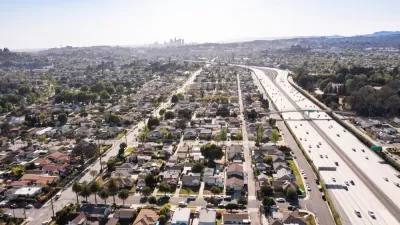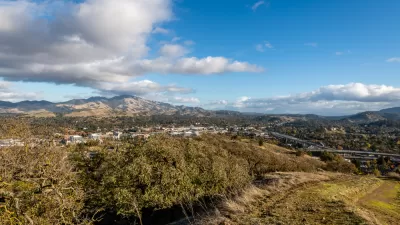A new report details the reach of California’s controversial environmental regulation, and warns of more consequences to come.

The Center for Jobs & the Economy recently published a report [pdf] quantifying the effect of the California Environmental Quality Act (CEQA) on development proposals around the state.
The report—authored by Jennifer Hernandez, a land use and environment law attorney at the Holland & Knight law firm—finds that CEQA lawsuits challenged almost half of all development projects in the state in 2020.
“In 2020 alone, there were 47,999 housing units targeted in CEQA lawsuits,” according to the center’s website. In addition to housing, the report finds a “explosion” of CEQA lawsuits challenging renewable energy development projects in 2020.
Among the key points of the report is concern that the 2022 Scoping Plan underway at the California Air Resources Board, required by the state’s landmark climate change law, AB 32, is only likely to encourage more anti-development lawsuits under CEQA.
“The CARB 2022 Scoping Plan, by implication and omission, invites more CEQA lawsuits against any type of housing that falls outside a limited number of housing types, all of which are infeasible, expensive, and frequently the target of CEQA lawsuits,” according to the website. “The CARB 2022 Scoping Plan ‘Natural and Working Lands’ chapter calls for the immediate cessation of new housing and other development on lands not previously developed–not even the buildout of existing cities and projects.”
FULL STORY: Anti-Housing CEQA Lawsuits Filed in 2020 Challenge Nearly 50% of California’s Annual Housing Production

Rethinking Redlining
For decades we have blamed 100-year-old maps for the patterns of spatial racial inequity that persist in American cities today. An esteemed researcher says: we’ve got it all wrong.

Planetizen Federal Action Tracker
A weekly monitor of how Trump’s orders and actions are impacting planners and planning in America.

California High-Speed Rail's Plan to Right Itself
The railroad's new CEO thinks he can get the project back on track. The stars will need to align this summer.

How Cities Can Support Climate Adaptation
In the face of federal cuts to climate resilience funding, a panel at ULI’s Resilience Summit offered suggestions for maintaining managed retreat and other climate adaptation programs.

Transportation Research Centers Lose Key Federal Funding
The federal University Transportation Center program funds critical transportation research and innovation at 35 consortia of colleges and universities.

Savannah Reduces Speed Limits on Almost 100 City Streets
The historic Georgia city is lowering speed limits in an effort to reduce road fatalities.
Urban Design for Planners 1: Software Tools
This six-course series explores essential urban design concepts using open source software and equips planners with the tools they need to participate fully in the urban design process.
Planning for Universal Design
Learn the tools for implementing Universal Design in planning regulations.
City of Clovis
City of Moorpark
City of Camden Redevelopment Agency
City of Astoria
Transportation Research & Education Center (TREC) at Portland State University
Regional Transportation Commission of Southern Nevada
Toledo-Lucas County Plan Commissions




























